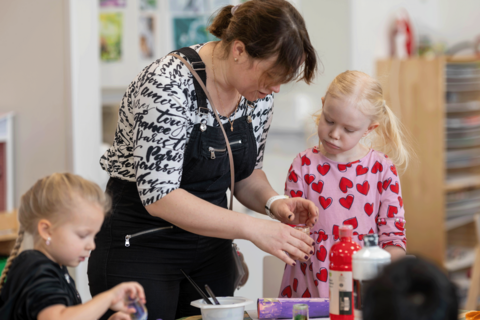Guardians satisfied with the quality of early childhood education in Espoo but worried about staff adequacy

Guardians are increasingly satisfied with their children’s early childhood education, but they are still concerned about the adequacy and high turnover of staff.
Guardians’ satisfaction with early childhood education has increased, according to the results of the assessment surveys carried out in Espoo in 2024. Responses were received from a total of 2,170 guardians in the spring and 1,971 guardians in the autumn. The survey has been conducted twice a year since 2021.
The survey is conducted by Espoo’s Finnish Early Childhood Education Unit to monitor client satisfaction. The results are used as part of the assessment and development of early childhood education, alongside other indicators.
The survey was directed at the clients of municipal and service voucher day care centres. At the same time, surveys were also conducted for day care centre directors and staff.
Guardians more satisfied than before, but some concerns remain
According to the survey results, most guardians were satisfied with their children’s early childhood education unit and the quality of early childhood education. In autumn 2024, the average satisfaction score among guardians was 5.6 (on a scale of 1–6), which is the highest level since the autumn 2022 survey.
Guardians were also satisfied with their children’s wellbeing and learning in early childhood education. In the autumn of 2024, the average score for this question was 5.2 (on a scale of 1–6).
“The results indicate a high level of satisfaction. They are consistent with the results of the capital region municipalities’ joint early childhood education client survey, which were published in January 2025,” says Development Manager Raija Laine from Espoo’s Finnish Early Childhood Education Unit.
Most of the guardians’ open-ended answers were also positive. However, it is clear that guardians are still concerned about the adequacy and high turnover of staff and the resources allocated to early childhood education. This concern is not surprising, as it has also been raised in previous years’ surveys.
“Staff shortage is a nationwide problem. We are working hard here in Espoo to improve the situation. In recent years, we have focused more on improving working conditions, strengthening leadership, and providing staff training. Some positive signs are visible. Last year, for example, the number of qualified childcarers in our recruitment processes increased compared to previous years,” Laine says.
Staff satisfaction improved
A total of 415 staff members responded to the survey in the spring and 459 in the autumn. Most of them were from municipal day care centres.
Employees’ satisfaction with their work and workplace slightly improved in 2024. In the 2024 surveys, staff satisfaction in terms of the two questions measuring satisfaction increased, with both reaching an average score of 4.7 (on a scale of 1–6, where 5 = satisfied).
Based on the responses, staff feel that their work is rewarding, valuable, and of high quality. The City of Espoo’s positive approach to training and the opportunities for additional training received praise from staff.
In open-ended responses, employees also mentioned experiences of work stress. The suggested areas for improvement included the level of pay for demanding work as well as the sufficient number and expertise of substitutes. However, the open-ended responses show that support from supervisors and co-workers as well as flexibility increase staff wellbeing.
“We have been systematically working to strengthen employee wellbeing and leadership in early childhood education, and the indicators we monitor show that we are moving in the right direction. For example, employee turnover has decreased and employees are more willing to recommend Espoo’s early childhood education as an employer. However, there is still a lot of work to be done,” Laine says.
Leadership development praised, staffing challenges still burden directors
Approximately 40 day care centre directors responded to the survey. Their average satisfaction score regarding their work and workplace was 4.9 (on a scale of 1–6) and remained at the same level as in 2023. Satisfaction with the pedagogical work and activities in their units received an average score of 4.7 in the autumn of 2024 (4.6 in the spring).
Directors feel that the challenging staffing situation and tight budget put a strain on leadership. However, the development of deputy and assistant director models received praise from the directors. Support received for developing leadership structures, pedagogical work and development activities promotes staff wellbeing.
“We have already taken many measures to support leadership and reduce the burden on directors. Work towards these goals continues. For example, the number of assistant directors has been increased, and it continues to grow. The entire work community benefits from sufficient leadership resources,” Laine says.
***
The first assessment survey in 2025 will be conducted from 17 April to 3 May. Active participation by guardians and staff will provide valuable feedback and up-to-date information on the state of early childhood education. You can take the survey here.(external link, opens in a new window)